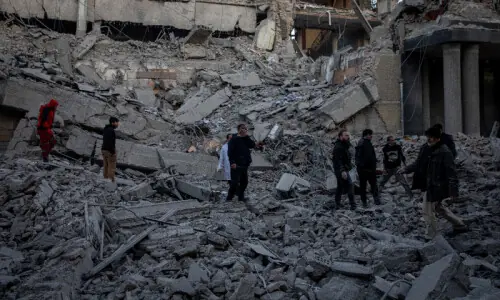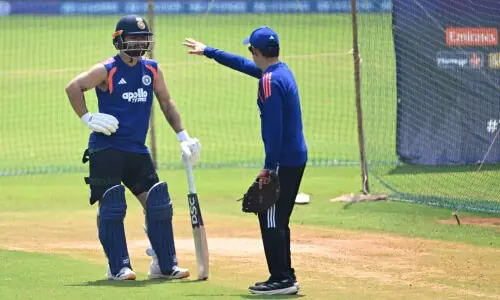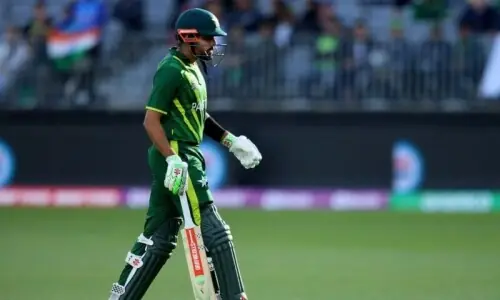MY recent book, Brokering Peace in Nuclear Environments, documents Pakistan-India crises since the 1998 nuclear tests. In it, I warn India, Pakistan, and third parties that have traditionally mediated these episodes not to consider crises as isolated episodes. Crisis behaviour in one episode will influence choices in every future iteration. This is because reputation matters to states. When you raise the stakes, you feel pressured to go further next time to avoid looking weak. Avoiding the perception of weakness may also prevent you from repeating restrained behaviour.
Consider Pulwama.
This crisis was preceded by the 2016 Uri episode. A strike killed 17 soldiers in an Indian military camp in Kashmir in September. What followed was defined as a watershed moment. India broke from its so-called strategic restraint in the face of terrorism by claiming that it had conducted surgical strikes across the LoC. The ‘strikes’ were little more than the usual kind of cross-LoC incursions. But Prime Minister Modi went to town. Even as Pakistan rubbished India’s claim, in the public perception, especially in India, Pakistan had been forced to absorb the strike.
Rather than focusing solely on ensuring de-escalation as they had previously, the US and third parties accepted India’s action as self-defence. Simultaneously though, they made clear that escalation was unacceptable. India therefore communicated to third parties that its action was only aimed at letting off steam to alleviate domestic pressure. The international community counselled restraint to Pakistan, offering guarantees that India won’t escalate if Pakistan would forego retaliation.
India’s decision to strike after Pulwama would have been facilitated by two Uri-related factors. First, the Pakistani decision not to strike back. While this choice de-escalated tensions at Uri, it had an emboldening effect on India. Second, the perceived support of the third parties, which India had reason to perceive as stronger than at Uri. Several capitals were sympathetic to India’s air strike and privately communicated as much to India and Pakistan.
The choice of Balakot seems to have been influenced by Uri.
The choice of Balakot as the target also seems to have been influenced by Uri. Modi was boxed in. By blaming Pakistan for Pulwama, he was de facto accepting that his post-Uri action hadn’t deterred militancy. More had to be done to make it sellable. Thus, the decision to strike beyond the disputed territory. Still, from its perspective, India was deliberately choosing a relatively barren target, though it claimed otherwise to satisfy domestic audiences,to keep Pakistan’s pain limited.
India’s mistake was to discount how strongly the ghost of Uri was haunting Pakistan too. It may seem counterintuitive, but this kind of cognitive dissonance is common in the fog of war. Actors tend to imagine the reality that suits them, and they’ll perceive ‘enemy thinking’ to be what they’d like it to be, often ignoring whether what they are imagining is even rational for the adversary to consider.
Pakistan would have been thinking about the precedent a no-response to the Indian strike may set. If it felt India was emboldened by Uri — the choice of Balakot suggests so — it would not have wanted India to feel that military action could now be routine in such situations. Pakistan’s claim that it maintains a low pain threshold vis-à-vis India would also have been challenged; no response would have suggested the threshold was geographically deeper than India penetrated this time, or much higher in terms of the level of damage the strike caused.
The third-party angle also played out differently than India would have hoped. As Pakistan absorbed the West’s post-Pulwama message, it felt the focus was on India’s right of self-defence rather than de-escalation.
An unfortunate coincidence would have reinforced Pakistan’s concerns about where the third parties stood. Pakistani civilian principals were unable to connect with their US counterparts for some time in the lead-up to the Indian strike. Some wondered if this was a deliberate attempt to ignore Pakistan to allow India time to do something. As far as I can tell it wasn’t. Yet, the Indian strike occurred before they could talk. When they did, the focus was naturally on de-escalation. Pakistan may now have read this as pressure not to retaliate. The perennial fear of the world ganging up in India’s favour would have played on the mind.
Corollary: the strike-back option would have been locked in. Any international pressure that India was banking on to hold Pakistan back would have been rendered irrelevant.
The Pulwama crisis is sure to affect the next iteration. Modi’s week didn’t go according to plan. The urge next time may be to go even further. A repeat crisis, especially before the Indian polls, could push things into the all-out war space. The acute lawlessness and anger among youth in the Kashmir valley makes another crisis-triggering spark an entirely plausible development.
The writer is an author.
Published in Dawn, March 5th, 2019





























